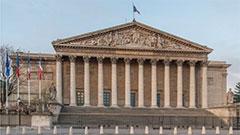
A provision allegedly introduced to cut foreign funding to Islamic radical groups may in fact severely limit the activities of hundreds of different religious movements.
by Alessandro Amicarelli — Bitter Winter has covered the new French draft law on extremism, explaining why, as it previously happened in Russia, measures intended to contain Islamic radicalism and terrorism create dangers for freedom of religion or belief in general.
One provision of the draft law that was overlooked by many, and which is no less dangerous than others, is Article 38. Ostensibly, its purpose is to limit the activities of Islamic radical organizations that are funded by citizens or foundations based in Saudi Arabia, the Gulf Emirates, or Turkey. However, as is the case for the law in general, provisions targeting one specific religion would be unconstitutional and non-compliant with other basic legal principles. To avoid this risk, these provisions are formulated in general terms. But precisely these general terms endanger hundreds of peaceful and law-abiding organizations (also including the peaceful organizations that constitute the vast majority of the Islamic groups).
According to Article 38, any cash contribution, benefit, or resource granted to a French religious association by a foreign State, legal entity, or individual, whose amount or value exceeds Euro 10,000 should be declared to the French administrative authorities. Note that this does not apply to monetary contributions only, but to benefits whose value should be assessed on a case by case basis. For instance, a foreign person or entity may assist a French religious association with services whose value may be assessed at more than Euro 10,000. This may also be the case when the foreign entity supports (with more than Euro 10,000 per year) missionaries or other personnel helping a French branch.
What happens after the foreign contribution has been declared? The administrative authority may believe that the contribution is contrary to a “fundamental social interest.” The French religious association will be heard, but the final decision will be rendered at the administrative level by the “prefect,” who operates under the Ministry of Internal Affairs. If the prefect still believes the contribution threatens a “fundamental social interest,” he or she will issue an order compelling the French religious association to give back the foreign contribution within three months. The failure to return the contribution will become a crime punished with a jail penalty of two years, plus a fine of Euro 30,000. The foreign contribution will be confiscated.
Why is the provision dangerous? The average French citizen may only have in mind the wealthy “Saudi Islamic fundamentalists” ready to finance potential terrorists in France. But, while such individuals may have sophisticated systems to elude the law, Article 38 would threaten the very existence of hundreds of peaceful Islamic communities, Evangelical churches, new religious movements, and other religious entities that depend for their support from parent organizations or churches abroad.
Imagine an Evangelical church in France that is a newly created branch of an American or Brazilian or South Korean missionary body (today, many large Evangelical churches have their headquarters in Asia, Africa, or Latin America rather than in the United States). Being new, it would have a small number of French members, and would depend on the help through money contributions, personnel, and other resources of its parent church abroad.
Under Article 38, these contributions should be declared to the “prefect,” who can forbid them as contrary to a “fundamental social interest.” Somebody can believe that a “prefect” would only act if the resources are clearly intended to support terrorism or political extremism. But this is not the case. France officially opposes groups it labels as “cults” (sectes) and officially cooperates, as confirmed by the Minister Delegate in Charge of Citizenship, Marlène Schiappa, when discussing the law, with UNADFI, a French anti-cult organizations that is part of FECRIS, the European Federation of Research and Information Centers on Sectarianism. FECRIS, which receives financial support from the French government, was recently exposed by the U.S. Commission on International Religious Freedom as a serious international threat to religious liberty.
FECRIS and France have a very liberal notion of “cult” (secte), and have listed hundreds of groups as such. Given the cooperation between the Ministry of Internal Affairs and the FECRIS affiliate in France, a “prefect” could easily rely on the proscription lists compiled by UNADFI or FECRIS to identify certain groups as “cults,” and conclude that “cults” threaten “fundamental social interests.” FECRIS has an international character and networks, and it may be enough for a movement to be proscribed as a “cult” in Russia or China to be also regarded as “against fundamental social interests” in France. Even outside the area of movements labeled as “cults,” xenophobia (also in the form of Islamophobia) or media campaigns may always play a role.
Article 38 creates a regime of discrimination against religions whose headquarters are not in France, violating several principles of international law. No exception is granted even for contributions coming from within the European Union. This is another egregious example of how statutes introduced as tools to contain radical Islam may and will be easily used against all sort of religious minorities—and a dangerous Trojan horse needing attention internationally.





